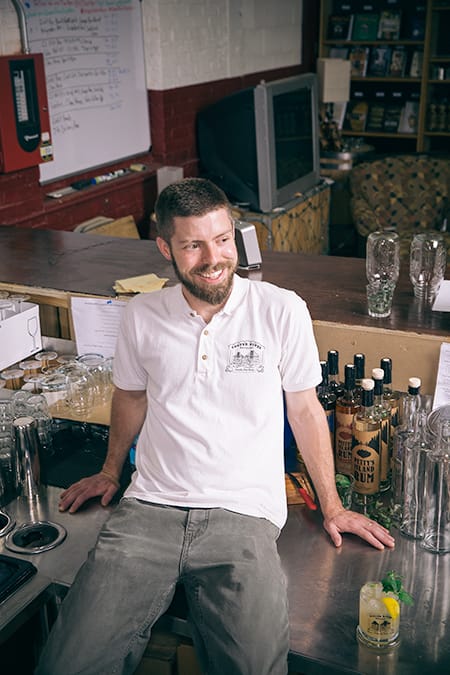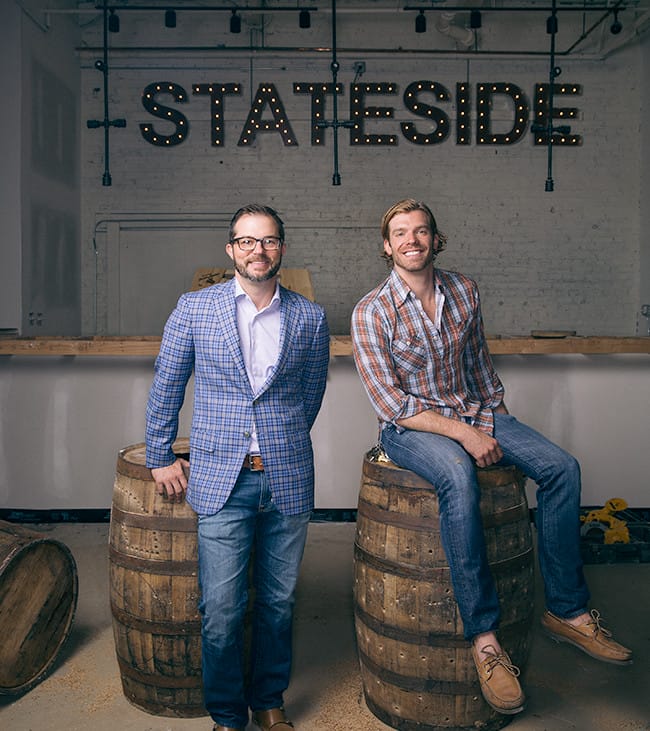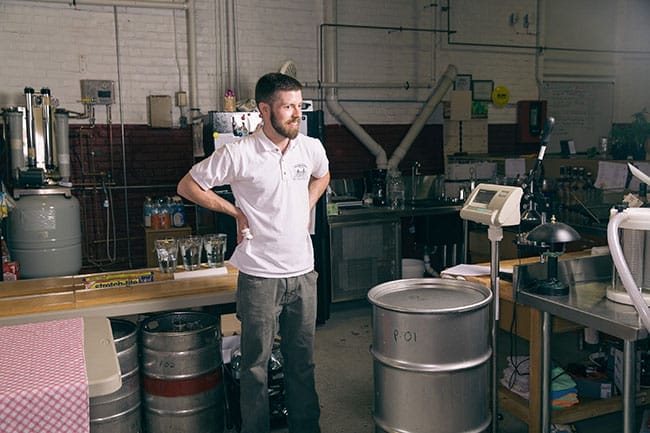
John Cooper (right) and Herman Mihalich enjoy the fermented fruit of their labor, Dad’s Hat Pennsylvania Rye Whiskey, straight out of the barrel.
In the back of an industrial park in Bristol, Pennsylvania, two pioneers of the craft distilling movement sweat and toil in an old mill. A copper still dominates the space, resembling a mix between a locomotive engine and an oven. Behind it on one side are a two-story stainless-steel holding tank and massive sacks of grain. On the other, wooden barrels balance on racks for as far as the eye can see. The air in the distillery makes you hold your breath. It smells somewhere between a candy store and a lacquer factory. This is the home of Mountain Laurel Spirits, makers of Dad’s Hat Pennsylvania Rye Whiskey.
For John Cooper W78 and his business partner Herman Mihalich CHE80 WG84, the whole thing started with a 2006 New York Times trend story. Its headline: “All but Lost, Rye Is Revived as the Next Boutique Find.”
The longtime friends, who met as fraternity brothers at Penn, chatted at a party soon after the Times article appeared. Wouldn’t it be fun, they said, to become the first rye whiskey distillery in Pennsylvania since 1989? It became an inside joke among their friends, but then it turned serious. They found themselves calling up the Pennsylvania Liquor Control Board in Harrisburg and asking whether rye was actually making a comeback in sales.
After getting the yes they’d hoped for, Mihalich and Cooper got to work on a business plan. Neither of them had experience in the spirits industry, but they both liked drinking whiskey, both were ready to change careers (Mihalich from chemicals and Cooper from executive roles in sales/marketing). Mihalich also had memories from growing up around his family’s bar in Monessen, Pennsylvania. As for the actual distilling process? That was the big question mark.
“The challenge with starting a whiskey business is that it’s impossible and illegal to try out some ideas or make small batches at home, the way you can with wine or beer,” Mihalich says. “It’s more of a shot in the dark because even once you’ve made it, you have to put it in a barrel and just wait.”
To boost their odds of producing good whiskey, Cooper and Mihalich spent two years driving out to workshops with Michigan State’s artisan distillery program. They studied the distilling process and perfected their recipe for Dad’s Hat. They also gathered investors—almost half of whom are fellow Penn alumni—and acquired their facility in Bristol, Pennsylvania.
Today, the duo is enjoying success as early adopters in the rye revival. Their classic Pennsylvania-style rye whiskeys are in 14 states and about a dozen European countries. In a few months, they’ll line bar shelves in MetLife Stadium and Lincoln Financial Field.
“We’ve started to make really, really good whiskey,” Cooper says. “We were making good whiskey before, but we’ve continuously gotten better, and we hear that from our customers and from critics as well.”
He and Mihalich, who still work as a two-man operation, won a silver medal at the 2015 San Francisco World Spirits Competition for their Pennsylvania Rye. Their whiskey finished in port wine barrels received a gold medal and 91-point rating (out of 100) from the Beverage Testing Institute this year.
“We go to places now, and people have heard of Dad’s Hat— and not just in our core markets,” Cooper says. “Two years ago that would have been unusual; now it’s not. That’s a testament to the quality and the strength of our brand.”
Mihalich and Cooper aren’t the only Wharton alumni who are capitalizing on the craft spirits craze. During the past few years, multiple alumni have joined the swelling ranks of American booze-makers—a movement that shot the number of U.S. distilleries from as few as 24 in the early 2000s to more than 700 by the end of last year, according to the Distilled Spirits Council. Overall, spirits have seen a marketshare increase in revenue from 28.7 percent in 2000 to 35.2 percent in 2014, worth $4.2 billion, leading to total spirits supplier revenues of $23.1 billion.
“It’s an exciting time to be in this industry,” says Cooper. “The space is getting a lot of attention—there’s a lot of conversation about it … and when people find out what you do, they can’t stop talking to you about it. I’d be lying if I said that wasn’t fun.”
Scenes from Mountain Laurel Spirits: (clockwise from top left) John Cooper takes a sample of rye to evaluate taste and alcohol levels; the hat from Herman Mihalich’s father, tavern owner and brand inspiration, hangs in the on-site bar; the custom-made still where the Dad’s Hat magic is made.

In the heart of downtown Camden, New Jersey, inside a cavernous old auto garage, James Yoakum W07 sits on a soft leather chair surrounded by his wares: bottles of Petty’s Island Rum and big wooden barrels. The air smells sweet and boozy, and a light-rail train thunders past every 10 minutes or so. There’s a bar menu written on a whiteboard. It prices Yoakum’s spirits by the glass, by the bottle, and in cocktails with names like Driftwood Dreamweaver and Petty’s Island Punch.
Between the board games on a nearby table, the horse-saddle bar stools, and the flannel shirt and jeans Yoakum wears, being a craft distiller seems more like a leisure pursuit than a job. They make their own schedules, invent spice mixes and experiment with things like “IPA-skey” (that’s a beer whiskey, for the uninitiated). Apparently, distillers have dart boards too.
But once Yoakum starts talking about how he got Cooper River Distillers up and running—and how he keeps it going—it turns out serious work goes behind all the spirited fun. There are permits to acquire, equipment to haul, markets to conquer, 275-gallon bags of molasses that drip on the floor.
Yoakum has a young entrepreneur’s perspective on it all. “I like coming to work every day. It’s fun, and it’s definitely a really cool job. We’re keeping the lights on for now, which is good for a 1-year-old business, but I think it’s on a trajectory to be successful.”

James Yoakum has a young entrepreneur’s perspective on craft distilling.
Much like the Dad’s Hat duo, Kentucky-born Yoakum had no liquor-making experience when he decided to open a distillery. Like Dad’s Hat, he tapped a small group of private investors. But on top of that effort and learning curve, he faced a second set of hurdles by placing his business in Camden, N.J.
Back in 2012, when Yoakum found a building and set out to open Cooper River Distillers in it, New Jersey had no other craft distilleries. He started moving into his current space in September 2012. He finally opened for business in April 2014.
“Getting open was like one long nightmare,” he says.
“There was a lot of local zoning and building code stuff that was just hard to figure out for everyone,” he says. “They’d come in and say, ‘What are you doing? It looks cool, but we have no idea. Is it legal? Is it dangerous? You tell us.’ Me tell you? But you’re the plumbing inspector. That kind of stuff.”
Once he was finally approved to start distilling, Yoakum hit another snag—one that’s common in the industry. He wanted to make bourbon and rye whiskey, but he couldn’t wait out the long aging times to start making money. His solution? Learn to make rum.
“I like to say we’re a whiskey distillery that’s making rum to pay the bills,” he says. Luckily for Yoakum, that rum has been well-received. It’s sold in about 30 local liquor stores—including the Wharton-connected giant Total Wine & More—and 15 bars. He says he’s been averaging a few new outlets each week.
He plied different combinations of yeast and molasses to arrive at a recipe for a white rum, then developed a spiced version and an aged one. For the spiced rum, Driftwood Dream, he “played with” 20 different flavorings before narrowing it down to seven: toasted applewood, cinnamon, ginger, vanilla beans, coffee beans, cloves, allspice and a touch of molasses. The aged rum, Rye Oak Reserve, sits in used Dad’s Hat barrels for nine months.
As Yoakum has been distilling and bottling those rums, he’s also been making batches of bourbon and rye whiskey and experimenting with cognac and “beer-skey.”
“The end goal is always: Let’s get whiskey into barrels so years from now we have whiskey coming out of barrels,” he says.
Cooper and Mihalich have struggled with long whiskey aging times too. “From a purely financial point of view, we have a substantial amount of cash sitting on racks over there in wooden barrels, so the working capital requirements are extremely high,” Mihalich says, referring to the rows of wooden and metal racks that fill the back of the former textile factory where they operate.
Adds Cooper: “It’s not like a typical business. … That’s one of the biggest problems in determining what your cash requirements are going to be both short-term as well as long-term. How do you predict the market three years from now if you’re going to release a three-year-old straight rye whiskey?”
While Yoakum found his answer in rum, the Dad’s Hat alums took a different tack. They started out making a whiskey that aged seven to nine months in small barrels. After they were happy with those results, they began putting whiskey into larger barrels to age for three years as a straight rye. They’ll begin selling that retail this fall. “That launch will be a very important event for us,” Mihalich says.

Scenes from Cooper River: (clockwise from left) the versatile still; spent grains after a mash; James Yoakum bottling a fresh batch of rum; capping and labeling a batch; Yoakum is owner and quite literally operator.
When Yoakum and the men of Dad’s Hat formed their distilleries, they sought out investors. Now Clement Pappas WG09 is filling that role—and serving as president of the board— for a new Philly-based vodka distillery called Federal Distilling, which is scheduled to release Stateside Vodka in the coming months.
Up until a few years ago, Pappas worked at the opposite end of the drink spectrum: the juice business. His family’s manufacturing company, Clement Pappas & Co., sold for a reported $390 million in 2011, and Pappas stayed on for a few years as CEO. In December 2013, he stepped down and decided to become an entrepreneur.
A mutual friend introduced him to Matthew Quigley, an aspiring vodka maker (and, coincidentally, the son of Wharton alum Mark Quigley WG77). Pappas was impressed by Matt’s concept and unique bottle design (complete with embossed brand name and swing hinge and stopper). Then he began researching the spirits industry.
“Craft beer was a trend that started 15 to 20 years ago, and now look at craft beer,” he says. “Craft beers represent 20 percent of the sales and all of the growth in the beer market. Distilled spirits are 10 to 15 years behind but moving in the same direction. ‘Craft’ is going to be the next megatrend in the spirits category.”

The cost of their custom-designed, embossed bottle (below) and gaining proper permits and zoning variances proved to be early business challenges for Clement Pappas (left) and partner Matthew Quigley, pictured here in their soon-to-be-launched Stateside Vodka distillery in North Philadelphia.
Among the growing number of craft distillers, Pappas says, very few are focused exclusively on vodka. Since whiskeys take years to age, “a lot of distillers are coming out with vodkas or gins or white whiskeys as a stopgap just so they can have a product to sell,” he adds. But Pappas liked that Federal Distilling would concentrate on making craft American vodkas—and only craft American vodkas—in the superpremium category.
The distillery is set to open this August and will offer tours and a tasting room. (Both Dad’s Hat and Cooper River have tours and tastings too.)
“It’s exciting, but of course there’s a little bit of nerves,” Pappas admits. “What’s going to happen when we finally do give birth to this product? We’ve tried to learn everything we can, but in some ways we don’t know what we don’t know yet.”
Pappas says Federal Distilling hopes to scale eventually, but still keep its craft identity intact, and he plans to remain involved in all major strategic decisions.
“Matt and I work hand in hand as partners. He’s the founder and the one dedicated to this full time, 100 percent—probably 110 percent. I’m involved more at the strategic level,” he says.
Cooper and Mihalich also have an eye toward growth. “We want to be the go-to rye whiskey in the mid-Atlantic,” Cooper says. “I think statistically we’re starting to achieve that. Our goal is to build a strong brand and continue to deliver really good products. If we do that, we’ll continue to grow at a solid, steady pace.”

The Dad’s Hat duo plans to expand in larger markets next: New York, New England, Chicago—and Europe, which has already proven fruitful. But as Wharton’s craft distillers continue to grow, so does their competition. Cooper estimates that at least 17 new distilleries have opened in Pennsylvania during the past few years. He sees that as a good thing, though.
“It increases buzz in the space and helps elevate the entire concept of what we’re doing,” he says. “We’re excited about more people coming into the space.”
There are so many would-be distillers out there that Yoakum has found himself saddled with frequent calls asking for advice. He now runs a seven-hour Aspiring Distillers Workshop every few months, drawing on everything he’s learned in the past few years about making spirits. Perhaps it’s only a matter of time before more Wharton alumni visit him in Camden, the Stateside team in Philadelphia and the Dad’s Hat operation in Bristol for advice on getting into this hands-on, hot and often odiferous business.
A Liqueur Legacy
John Amos Cooper WG05—no relation with John Cooper of Dad’s Hat or the Cooper in Cooper River—is a third-generation spirits-maker. His grandfather bought the rights to American liqueur brand Charles Jacqui et Cie after Prohibition, and his father created Chambord Liqueur in the 1970s.
When Cooper, his father and his brother sold Chambord for over $200 million in 2006, Cooper set out on his own—to make a liqueur. It was in his blood, so to speak.
His father’s company had sold a ginger liqueur called Canton in the 1990s. It wasn’t particularly successful, but 10 years later, Cooper felt the market was ready for a super-premium version. He played around with a recipe: some cognac here, a dash of vanilla there, a sprinkling of turmeric. “It’s much more of an artistic process than a scientific one,” he adds.
Three superstar chefs, including James Beard-winner Wylie Dufresne, helped Cooper perfect his flavor. Dozens of iterations and more than a year later, the new Domaine de Canton had its recipe.
In 2008, the same year it hit stores, Domaine de Canton won best liqueur at the San Francisco World Spirits Competition and Best of Show at the World Beverage Competition. But that doesn’t mean it was a financial success.
“Initially, I was very underwhelmed because it’s a slow process,” Cooper says. “At the same time, I was overwhelmed by the cost of taking something out to market in the liquor business.”
Domaine didn’t turn cash-flow positive until 2012. By the time Cooper sold the brand last July for $30 million, it was available in every U.S. state and 12 international markets. As he waited for Domaine to take off, Cooper also began working on a second product. Sweet Revenge, a liqueur made from whiskey and wild strawberry mash, is “a more commercial product, whereas Domaine is more artisanal,” he says.
Cooper is still working on building a following for that one, since his target demographic is “a little less loyal to any particular brand.” (So far, it’s available in 36 of the 50 U.S. markets.)
He has also started developing a new French liqueur, but those details aren’t ready for the public yet. “That’s what’s exciting to me: the development of new brands,” he adds. “To be able to continue to do that would be great.”
Cooper admits that liquor-making isn’t for the risk-averse. “It sounds very sexy and almost gourmet,” he says, “but it’s actually a really tough industry. There’s a lot of luck, but you can make good money too.”
Molly Petrilla C06 is a freelance writer based in New Jersey.

























